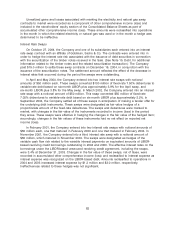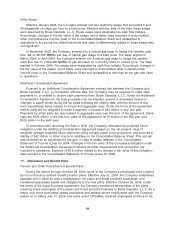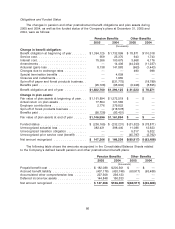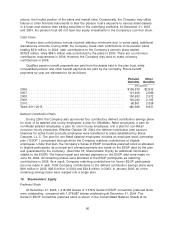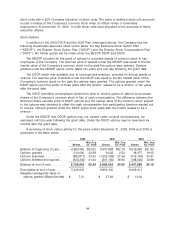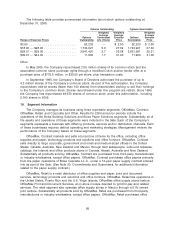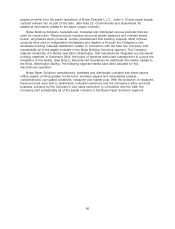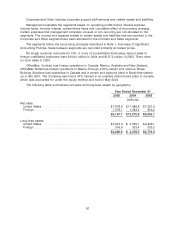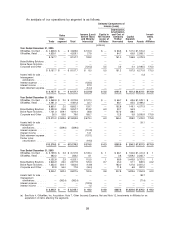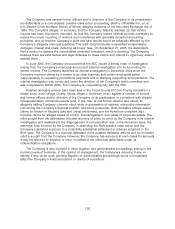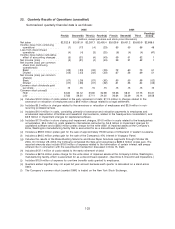OfficeMax 2005 Annual Report Download - page 97
Download and view the complete annual report
Please find page 97 of the 2005 OfficeMax annual report below. You can navigate through the pages in the report by either clicking on the pages listed below, or by using the keyword search tool below to find specific information within the annual report.Restricted Stock and Restricted Stock Units
In 2005, the Company granted to employees and directors 722,623 restricted stock units
(‘‘RSUs’’). The weighted-average grant-date fair value of the RSUs was $33.15. These RSUs vest
after defined service periods in the following years: 52,710 units in 2006; 621,013 units in 2007;
45,900 units in 2008; and 3,000 units in 2009.
In 2004, the Company granted 366,775 RSUs to employees and 14,765 shares of restricted
stock to nonemployee directors. The weighted-average grant-date fair value of the RSUs and
restricted stock shares was $32.14. The vesting of the 2004 RSU award was based on performance
criteria established for 2004 and 2005. The performance criteria were not met; therefore, no
compensation expense was recorded for this RSU award, and these units will not be distributed.
The restricted stock granted to directors vests six months from their termination or retirement from
board service, and 13,680 of these restricted stock shares remain issued and outstanding at
December 31, 2005.
In 2003, the Company granted to employees 1.2 million shares of restricted stock and
0.1 million RSUs. The weighted-average grant date fair value of the restricted stock and RSUs was
$25.09. The restricted stock and RSUs were scheduled to vest at the end of July 2006. However, if
specific performance criteria were met, some or all of the restricted stock and RSUs could vest
earlier than July 2006. The restricted stock granted to employees that terminated from OfficeMax
and became employees of Boise Cascade, L.L.C. vested in October 2004 in connection with the
Sale. The performance criteria triggering accelerated vesting were met by the end of 2004, causing
the remaining restricted stock shares and RSUs to vest at the end of January 2005 and to be
distributed in February 2005.
Restricted stock shares are restricted until they vest and cannot be sold by the recipient until
the restriction has lapsed. RSUs are restricted until they vest and are convertible into one common
share after the restriction has lapsed. In accordance with the requirements of SFAS No. 123, no
entries are made in the financial statements on the grant date of restricted stock and RSU awards.
The Company recognizes compensation expense related to these awards over the vesting periods
based on the closing prices of the Company’s common stock on the grant dates. If these awards
contain performance criteria, management periodically reviews actual performance against the
criteria and adjusts compensation expense accordingly. In 2005, 2004 and 2003, the Company
recognized $9.2 million, $25.1 million and $6.5 million, respectively, of pretax compensation
expense and additional paid-in capital related to restricted stock and RSU awards.
Restricted shares and RSUs are not included as shares outstanding in the calculation of basic
earnings per share, but are included in the number of shares used to calculate diluted earnings per
share, if dilutive. When the restriction lapses on restricted stock, the par value of the stock is
reclassified from additional paid-in-capital to common stock. When the restriction lapses on RSUs,
the units are converted to unrestricted common shares, and the par value of the stock is
reclassified from additional paid-in-capital to common stock. Unrestricted shares are included in
shares outstanding for purposes of calculating both basic and diluted earnings per share.
Restricted stock and RSUs may be eligible to receive all dividends declared on the Company’s
common shares during the vesting period; however, such dividends are not paid until the
restrictions lapse.
Stock Units
The Company has a shareholder approved deferred compensation program for certain of its
executive officers that allows them to defer a portion of their cash compensation. These officers
may choose to allocate their deferrals to a stock unit account. Each stock unit is equal in value to
one share of the Company’s common stock. The Company matches deferrals used to purchase
93


